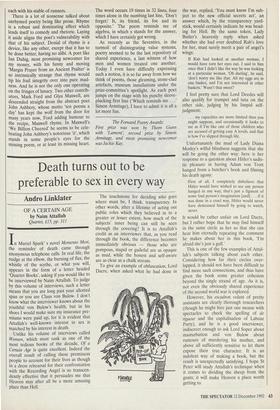Death turns out to be preferable to sex in every
way
Andro Linklater
OF A CERTAIN AGE by Naim Attallah Quartet, DS, pp. 311 Unlike his volume of interviews called Women, which must rank as one of the most tedious books of the decade, Of a Certain Age is quite excellent. Indeed the overall result of calling these prominent people to account for their lives as though in a dress rehearsal for their confrontation with the Recording Angel is so transcen- dently effective that it persuades me that Heaven may after all be a more amusing place than Hell.
The touchstone for deciding who goes where must be, I think, transparency. In other words, after a lifetime of acting out public roles which they believed in to a greater or lesser extent, how much of the subjects' inner being can still be seen through the covering? It is to Attallah's credit as an interviewer that, as you read through the book, the difference becomes immediately obvious — those who are pompous, stupid or guileful are as opaque as mud, while the honest and self-aware are as clear as a chalk stream.
To give an example of obfuscation, Lord Dacre, when asked what he had done in the war, replied, 'You must know I'm sub- ject to the new official secrets act', an answer which, by the transparency yard- stick, would certainly indicate he was head- ing for Hell. By the same token, Lady Butler's heavenly reply when asked whether she had ever doubted Rab's love for her, must surely merit a pair of angel's wings: If Rab had looked at another woman, I would have torn her eyes out. I said to him once that I didn't like the way he was looking at a particular woman. 'Oh darling', he said, `don't worry me like that. All my eggs are in one basket, and I'm not interested in other baskets.' Wasn't that sweet?
I feel pretty sure that Lord Deedes will also qualify for trumpet and tutu on the other side, judging by his limpid self- judgment:
. . . my capacities are more limited than you might suppose, and occasionally it looks to me as if I'm like one of those children who are accused of getting easy A levels, and that is how I've slipped through life.
Unfortunately the mud of Lady Diana Mosley's wilful blindness suggests that she will be going the other way: here is her response to a question about Hitler's sadis- tic pleasure in having Adam von Trott hanged from a butcher's hook and filming his death agony: First of all, I completely disbelieve that Hitler would have wished to see any person hanged in any way; that's just a figment of some foul person's imagination [and] . .. if it was done in a cruel way, Hitler would never have demeaned himself by going to watch, never.
It would be rather unfair on Lord Dacre, but I rather hope that he may find himself in the same circle as her so that she can hear him eternally repeating the comment he makes about her in this book, `I'm afraid she's just a gull.'
This is one of the few examples of Attal- lah's subjects talking about each other. Considering how far their circles over- lapped, it should not have been difficult to find more such connections, and thus have given the book some greater cohesion beyond the single strand of age. As it is, not even the obviously shared experience of the second world war is explored.
However, his escadron volant of pretty assistants are clearly thorough researchers (though he might hire just one mouse with spectacles to check the spelling of de rigueur and the capitalisation of Labour Party), and he is a good interviewer, indiscreet enough to ask Lord Soper about masturbation and von Bulow about rumours of murdering his mother, and above all sufficiently sensitive to let them expose their true character. It is an indolent way of making a book, but the result is unexpectedly satisfying. I hope St Peter will study Attallah's technique when it comes to dividing the sheep from the goats; it will make Heaven a place worth getting to.


































































 Previous page
Previous page